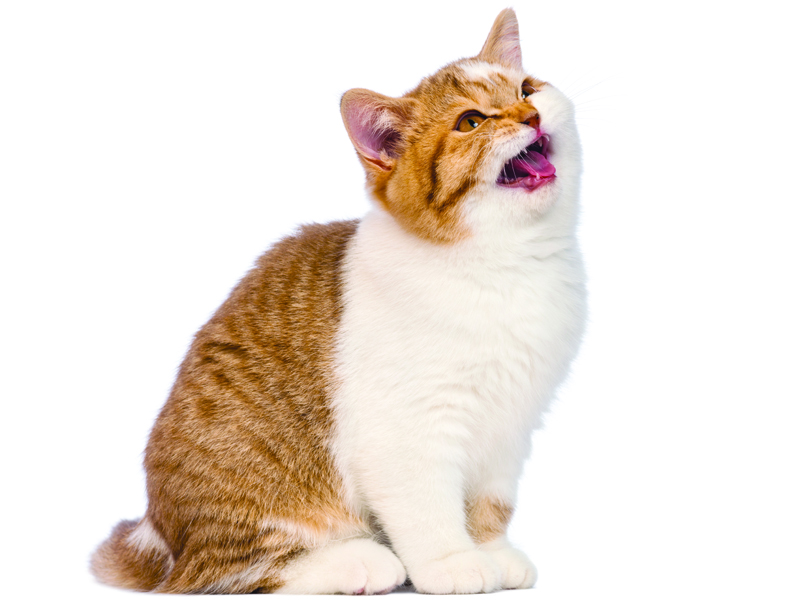Does your kitty “talk” more than she used to? Excessive vocalization may be a cry for help.
One of the most interesting things about cats is their wide diversity of vocalization patterns, and their repertoire of mews, meows and howls. Some, like the Siamese and other Oriental breeds, seem to “gab” almost incessantly, like talkative children. Others are almost completely silent, choosing to keep their own counsel and rarely expressing themselves vocally. The majority of cats fall somewhere in between; speaking when hungry or agitated, and otherwise maintaining their calm, silent demeanor.
Certainly, cats are very individual in their vocalization, and their caregivers soon come to understand what to expect. The time to be concerned is when your cat’s normal pattern changes, especially when a once-quiet cat begins to “talk” a lot more than he used to.
“Toller use to be a very quiet cat, but now he meows all the time,” says Cheryl. “He seems healthy, but I can’t help wondering if something’s wrong.”
Physical Causes
Cats are among the most stoic of animals, but severe discomfort or pain can prompt them to communicate their distress to those around them. If your cat becomes especially talkative, and remains so for more than a few hours, seek veterinary assistance to rule out any disease or injury.
- Urinary tract blockage is the most serious medical cause of excessive crying. This is a medical emergency of the first order, and may be accompanied by frequent trips to the litter box, or even attempts to urinate outside the box, with no production of urine. See your veterinarian immediately.
- Pain in other abdominal organs can also cause a cat to cry out repeatedly. Trauma to these organs after a fall, or an infection of the lining of the abdomen called peritonitis, can cause enough pain and anxiety to make a cat restless and much more vocal than usual, especially when the abdomen is touched or the cat is picked up.
- Abscesses are infections that usually occur under the skin, often on the back or hindquarters, or near the tail where it joins the body. They can be extremely painful when the cat tries to sit or lie down, or when someone tries to pet him or pick him up.
- Changes in a cat’s ability to see, hear, maintain his balance or think clearly can cause enough anxiety that he will call out repeatedly. Concussions from trauma, ear infections, high blood pressure, strokes, diabetes, hyperthyroidism, kidney problems and many other diseases can cause such problems. Your vet can check for these issues and determine a course of action once there is a diagnosis.
Behavioral Causes
If your veterinarian rules out disease or injury, the next step is to evaluate the cat for behavioral problems. The list of psychological triggers for excessive vocalization is long, but the following are the ones we see most often.
- Major changes in a cat’s environment can create so much anxiety and stress that she will act out with abnormal behaviors, including constant crying. Moving house is a very significant stressor, as is the introduction of new humans or felines into the household. A cat that is tightly bonded to one family member will react badly to a shift in that person’s attention to others, like a new baby or spouse. The loss of a companion cat or dog can cause the one left behind to feel great loneliness and fear, with unusual crying as a result.
- For reasons that may not be apparent, cats sometimes seem to develop obsessive-compulsive traits even when the environment has not greatly changed. These may show up as self-mutilation like hair pulling, sudden shyness or excessive boldness, overeating or loss of appetite, and other changes in normal behavior. The cat may also become unusually needy and vocally demanding of attention, food, opportunities to leave or enter the home and the like. This type of sudden excessive vocalization can be difficult to diagnose and the cause impossible to identify.
- Older cats may experience a kind of senile dementia, although this has not been well studied in felines. Over a period of a few weeks or months, you may recognize subtle signs that an older cat’s memory is failing. She may suddenly seem to become “lost” in a very familiar home, wandering through the house and calling for company. These cats usually have normal vision, but they nonetheless act as though they don’t know where they are, at least transiently. We do not have good treatments for senility in cats, but identifying the problem can help you understand how to care for her to reduce her sense of being lost and in danger.
After having a vet eliminate any physical problem for Toller’s crying, Cheryl realized her feline friend might have been upset by some renovations she’d had done in her home. “I’d moved the bedroom and home office into different areas and Toller didn’t like it.” With some extra TLC, Toller gradually got used to the changes and calmed down again. Says Cheryl, “It was a good lesson in learning how to be aware and understand your animal.”
Therapies for Behavioral Crying
Alternative modalities such as homeopathic remedies and flower essences can be helpful for cats dealing with bereavement, a change of environment, and similar issues causing stress and excessive crying.
Bach Rescue Remedy is an excellent flower essence combination to have on hand for acute stress, while individual remedies such as Aspen and Mimulus (for fear and anxiety), Heather (for separation anxiety) and Walnut (for change) can also be helpful. Flower essences are safe and gentle and can be added to water or applied topically. For homeopathy, it’s best to consult with an experienced holistic vet when choosing remedies and dosages.
In cases where there seems to be no clear physical or behavioral cause for the increased vocalization, an animal communicator may be able to help get to the root of the issue.







No Comment